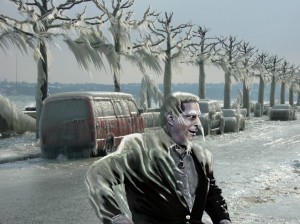Some of our snow is said to be missing, though you couldn’t tell it if you looked around in one of the harshest winters in decades. The sky has been falling nearly everywhere, and 67 percent of North America now lies under a blanket of white. It’s a thin blanket in places, but it’s almost twice the size as this time last year.
Life is particularly tough on the Great Lakes. Lake Superior is 92 percent frozen over, breaking the February record set two decades ago, and it’s getting worse, unless you’re an ice fisherman, in which case it’s getting better.
They’re expecting even more ice this week in a region where winter is always miserable. The coyotes apparently like it, however, and were seen strolling on the ice on Lake Michigan last week, just off Chicago. Perhaps they were stalking deer.
Life is even tougher for the climate scientists who are trying to keep the global-warming scam alive. The latest villains for the global-warming slowdown, which we were earlier told would never happen, are the trade winds. They’re blowing the heat away to a hidden place, and the researchers think they may have found it.
The case of the missing snow is particularly sad. One ski bum, writing in The New York Times, declares that the Olympics in the years ahead will be running out of snow unless “climate change is reined in.”
Porter Fox, an editor at Powder magazine — powder as in little white stuff, not powder as in guns — writes that if something isn’t done about the weather soon, two-thirds of the European ski resorts will likely close by the year 2100. More than half of the 103 ski resorts in the Western states may not be “viable” in 30 years.
If you believe this kind of stuff, and only a declining number of people do, the Winter Olympics at the turn of the next century could be held in Havana, where the skiing will be on water and the bobsledding on sand. He writes that only six cities will be cold enough to host the Winter Games by 2100.
Mr. Fox may have been spending too much time in front of a fireplace, sipping hot buttered rum, imbibing too much of a certain newspaper obsessed with peddling fears of “global warming” and the happier prospect of the mirth and gaiety of life with President Hillary Clinton.
Global “warmists,” including Barack Obama, are eager to shut down debate about it and start shoveling out the government cash to “rein in” the heat. “The debate is settled,” the president told Congress in his State of the Union speech. “Climate change is a fact.”
Well, of course. The climate is always changing, but never the liberal appetite for spending money in futile attempts to change the unchangeable. Science always has lots of answers, which is why so many “settled facts” are changed so frequently.
But curious minds want to know, so certain scientists set out to find out how they could have been so wrong when they’re so smart. They’re eager to save the scam. How could global warming be slowing down while greenhouse gas is surging to record levels? Life is such a puzzle.
This is what high science calls “a head scratcher of a discrepancy,” and that’s how several researchers, writing in Nature magazine, discovered that the wind off the Pacific Ocean is forcing warm water deep into the sea, which in turn lifts cooler water to the surface.
This has cooled average global temperatures .36 of a degree since 2001. That’s not a lot, but it might be enough to slow down the warming.
The winds are powerful and getting stronger. “Their acceleration over the past couple of decades is way stronger than you’ve ever seen in a climate model, about twice as strong,” Matthew England, a climate professor at the University of New South Wales in Australia, tells NBC News.
All this might be the computer’s fault. John Fyte, who studied the “warming hiatus” from Canada, thinks the computers need more supervision by a human brain. “If you let the models do what they want to do without constraining them by observations, then they will not reproduce the hiatus.”
The “global-warming community,” as the researchers are fond of calling themselves, have thus stumbled on to a remarkable discovery, more dramatic than anything from Newton, Einstein or Hawking: Real life can intrude on the most sophisticated theory, and often does.
Science at its best is skeptical, a community of doubters and agnostics. At its worst, it’s a community of theologians, out to protect its scams of preconceived “truth.” Garbage in, garbage out, none of it hot.
. . . . . . . . . . . . . . . . . . .
Wesley Pruden is editor emeritus of The Washington Times.
